Teaching and Apprenticeship in Slavophile Communication: Aleksey Khomyakov’s Correspondence with Yuri Samarin
The article examines the correspondence of two prominent representatives of the Slavophil circle - Aleksey Khomyakov and Yuri Samarin. The relations that developed between them and which were vividly reflected in the epistolary dialogue were friendly, yet they were built according to the teacher-student model, a secular version of a spiritual father and a spiritual son. In the study of the epistolary dialogue between Khomyakov and Samarin, the historical-literary and structural-typological methods of literary criticism are used. A significant age difference (Khomyakov was born in 1804, while Samarin was born in 1819) and, accordingly, the experience of life and philosophizing also affected this dialogue. Samarin was forced to leave for service in St. Petersburg, which seemed hostile and disastrous to the Slavophils. He desperately appealed to the senior comrade Khomyakov (an authority, the ideologist of the Slavophil circle) who stayed in Moscow. Samarin, in letters to Khomyakov, confesses his weaknesses and blunders, realizing his imperfection and recognizing the influence of the unhealthy Petersburg atmosphere on himself, cries out for help, and, finally, simply asks what to do, asks to show the way. To the confusion of Samarin, Khomyakov clearly, calmly and firmly answers what needs to be done (literally point by point), explains Samarin’s condition, comforts, seeks to dispel melancholy, expresses unshakable faith in the future. His word gains super convincingness due to the fact that he appeals to the biblical imagery, aphoristically, often actualizes the category of the future tense, taking on the role of a prophet, and, using this opportunity, he reminds Samarin of his fulfilled “prophecies”. Evoking confidence in his words and in his personality, Khomyakov raised Samarin, led him along. It is characteristic that, in letters to Samarin, Khomyakov never resorts to logical paradoxes in order to (re)convince the addressee (their structure is as follows: the thesis is the opinion of the addressee, with whom Khomyakov imitates he agrees; the antithesis is the opinion of Khomyakov himself, which is allegedly shared by the addressee; the synthesis is based on the opinion of Khomyakov, presented as their general, compromise solution); although he widely uses them in messages to other correspondents and in printed works. It would seem that, in letters to Samarin, whom the ideologist of the Slavophil circle considered a logician, such logical manipulations would be the most natural, but their absence was not accidental: there were no ideological disagreements between Khomyakov and his student, and the trusting relationship did not allow intellectual tricks. Khomyakov was not mistaken, his word in his epistolary dialogue with Samarin was extremely effective. The young man willingly followed the ideologist of the Slavophil circle.
Keywords
Aleksey Khomyakov, Yuri Samarin, Slavophilism, correspondence, letter, epistolary works, confession, sermon, parableAuthors
| Name | Organization | |
| Kuzmina Marina D. | Saint Petersburg State University of Industrial Technologies and Design; Herzen State Pedagogical University of Russia; Institute of Philosophy and Law of the Siberian Branch of the Russian Academy of Sciences | mdkuzmina@mail.ru |
References

Teaching and Apprenticeship in Slavophile Communication: Aleksey Khomyakov’s Correspondence with Yuri Samarin | Vestnik Tomskogo gosudarstvennogo universiteta. Filologiya – Tomsk State University Journal of Philology. 2021. № 74. DOI: 10.17223/19986645/74/16
